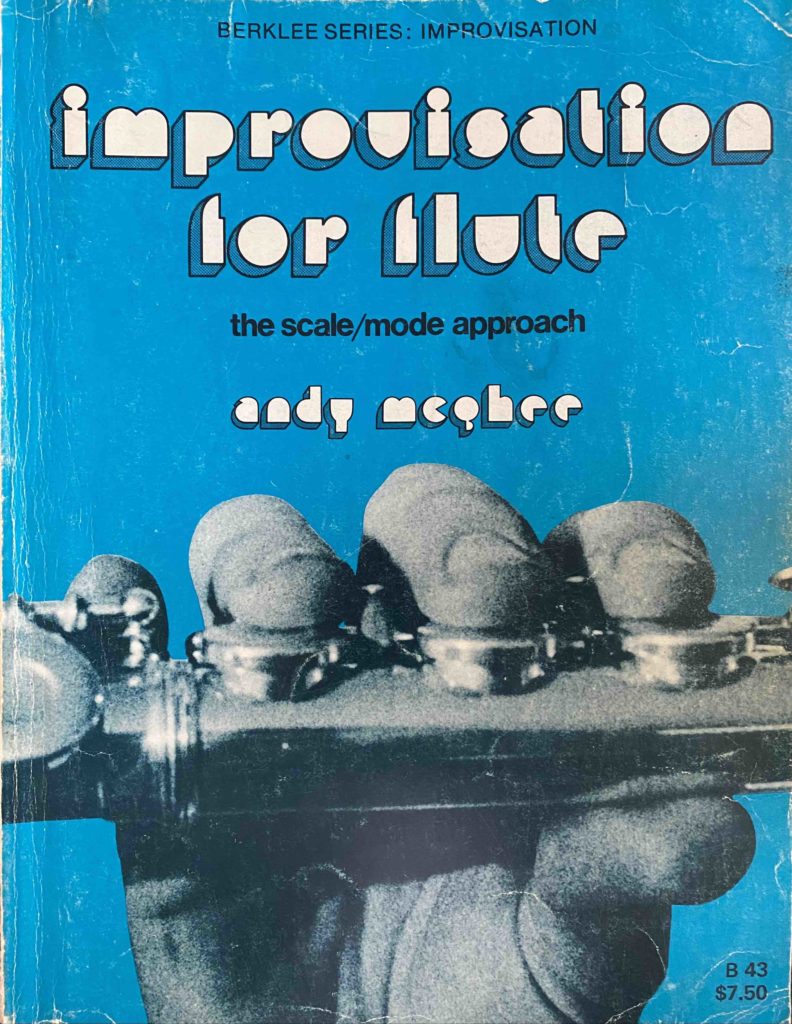
Mick Goodrick once told us in his Advanced Guitar Performance Lab (in Berklee) that you can use flute books as a way to develop your sight reading skills. It’s because the range is similar to guitar & flute is a C concert instrument.
This single piece of advice opened up a lot of things for me.
I started checking out more flute books for one… and I started using more flute material for my own practice sessions.
It works and it gives a different perspective for guitar players.
This book from Andy McGhee is the version of his book for flute. There’s another one for saxophonists, but I got this one because of what Mick told us years ago.
So how’s this book? Is it any good? Is it a good one for guitar players to get?
Well if you need tablature, don’t get it… coz there ain’t any.
Also, if you really are looking for a step by step methodical “how to improvise” book or method, this isn’t the book for you either.
The strength of this book is that it gives a great selection of notated exercises, phrases, etudes for the serious musician to work on.
What that means is that if you already know some basic jazz theory – this book can provide structure for your practice sessions.
Personally, I’ve been using it whenever I need to work on the guitar & am looking for new ideas. I’ll take one or two exercises and that will be a practice session. I’ve also sight read through an entire chapter (it’s a workout) and used that to develop my improvisational vocabulary and chops.
Potentially for someone who is dedicated to working through the ENTIRE BOOK, you will get a structured approach. I like how Andy choose to introduce specific modes so that it would lead into the related II-V-I chord progression (major & minor key) as well as turnbacks (turnarounds) and diminished chord application.
Do note that some assembly is still required… you need to work through all the exercises and connect them with some level of intuition & creativity. Although the book is structured in a step by step way, there’s still more work needed to get it beyond the written examples.
At 120 pages, there’s A LOT of material to work on. If you’re patient and up for it, this book is one that might be able to help you improve both your skills and melodic language as well. Patience is the key word here.
In conclusion, I recommend this book for intermediate & advanced musicians who want more material for structured practice sessions. For me, that is the strength of this book. For beginners, I recommend studying this book with the guidance of an experienced teacher who can explain the examples to put them more in context.
Pros: Good material, cool exercises that are different for different keys/modes. Some books take the lazy way out by simply transposing the same exercise & adjusting for the range… not this one! This was written with care & has some good stuff.
Cons: If you’re a guitarist who is following me for my guitar content… and you don’t read standard notation, this book will be either (i) a good way to learn to sight read as well or (ii) difficult because there are no tabs, because this book wasn’t written specifically for guitar.
TLDR: A good book if you’re looking for some cool etudes and exercises to develop your improvisational vocabulary & give more structure to your practice sessions.
You can get the newer edition of this book from Amazon here: https://www.amazon.com/Improvisation-Flute-Scale-Approach-Berklee/dp/142346740X or you can try from your local bookstores that carry Berklee Press/Hal Leonard books.
[Review Archive]
I wrote a lot of other book, course and video reviews too.
Check out the rest here:
[Read more reviews]
[Submissions for Review Consideration]
- Are you an author who wrote a jazz, guitar or music book?
- Have you created a DVD or an online video course or subscription based website?
- Would you like me to review your book/course?
Please send me a message at azsamad3 at gmail.com with:
For courses: a link to the course/video/product + access info etc.
For books: a link to the book (Dropbox) or PDF attachment (if it’s small) for review consideration.
Depending on whether I dig the book/course, I’ll let you know if I do plan to review it!
I cannot guarantee a review for every submission & if I’m not too into it, I may opt not to review it. I mean, it’s better to get a good review that for me to write a bad review just because it’s not a match for the kind of stuff I dig right? :p
NOTE: All reviews reflect my honest personal opinion so be aware that I will point out both cool Pros and Cons that I see in the work. You dig?
Leave a Reply